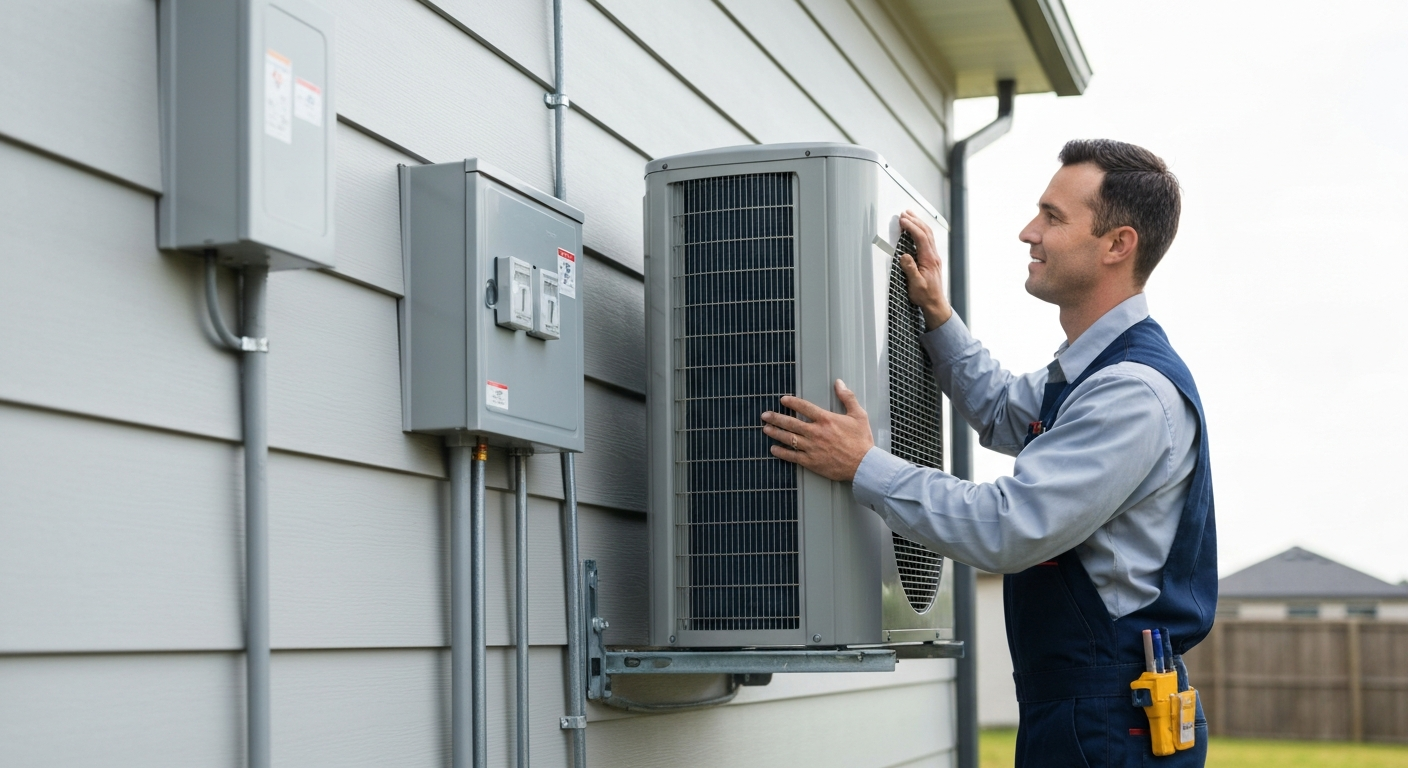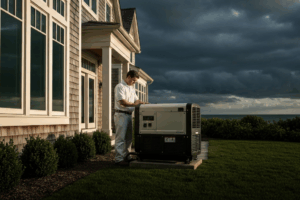
The Most Profitable Contractor Licenses Beyond Electrical
As a licensed electrician, you are the master of a critical, in-demand trade. Whether you hold a master electrician license or are a seasoned commercial electrical contractor, your expertise is the backbone of modern infrastructure. But in a rapidly evolving industry, the most successful professionals are those who look beyond the main service panel. True business growth comes from strategically expanding your skillset into adjacent, high-demand areas. This is where exploring other profitable contractor licenses becomes a cornerstone of your electrical business growth strategies.
The rise of green energy, smart technology, and electrification is creating unprecedented opportunities. Homeowners and businesses aren’t just asking for new outlets; they want integrated systems for comfort, security, and sustainability. By diversifying electrical services, you can move from being a subcontractor to the primary solutions provider, capturing more value on every project. This article explores the most lucrative licenses and certifications you can add to your toolbelt, turning your deep electrical knowledge into a launchpad for new revenue streams.
The HVAC Contractor License: Capitalizing on Comfort and Efficiency
One of the most natural and profitable expansions for an electrician is into Heating, Ventilation, and Air Conditioning (HVAC). The connection is obvious: modern HVAC systems, especially high-efficiency models, are electrically complex and require a deep understanding of power requirements, which you already possess.
Why HVAC? The Mini Split Installation Boom
The market for ductless systems, often called a mini split air conditioner, is experiencing sustained growth. According to a U.S. market report, the mini split air conditioning system market is forecast to grow from USD 1.4 billion in 2024 to USD 2.4 billion by 2034. Homeowners love them for their energy efficiency and room-by-room zoning capabilities, making them ideal for additions, retrofits, and older homes without existing ductwork. Every mini split installation requires a dedicated electrical circuit, and often a new disconnect—work that falls squarely in an electrician’s domain. By obtaining an HVAC contractor license, you can handle the entire job from start to finish. Furthermore, your expertise is invaluable for installing and servicing other high-demand appliances like the modern electric water heater and the increasingly popular electric tankless water heater, which have significant electrical load requirements.
The Licensing Path: A California Example
It’s critical to understand that in many states, including California, your electrical license likely does not cover the full scope of HVAC work. In California, for example, an electrician with a C-10 electrical contractor license cannot legally install an air conditioning system. This work requires a separate C-20 Warm-Air Heating, Ventilating and Air-Conditioning license. Earning this license allows you to become the single point of contact for these lucrative projects, preventing you from handing off profitable work to another contractor. Readers should be aware that licensing requirements vary significantly by state and should always check with their local regulatory bodies to ensure compliance.
Powering the Future: EV Charger and Solar Certifications
The transition to a green economy is not a distant trend; it’s a present-day gold rush for skilled tradespeople. Electricians are uniquely positioned to lead this charge, as both electric vehicles and solar power are fundamentally electrical systems.
Become an EV Charger Installation Certification Expert
To support a mid-adoption scenario of 33 million electric vehicles, the National Renewable Energy Laboratory (NREL) estimates the U.S. will need approximately 28 million EV charging ports by 2030. While any qualified electrician can install a charger, obtaining a specialized EV charger installation certification—often a voluntary credential from manufacturers or training organizations like EVSE providers—signals a higher level of expertise to clients. It shows you are fluent in the specific demands of Level 1, Level 2, and DC fast charging. The National Electrical Code (NEC) is constantly adapting to this technology, and staying current is key. The 2023 NEC, for instance, has updated and simplified certain rules. To ensure you’re up to date, it’s beneficial to review materials on how the 2023 NEC simplifies Electric Vehicle (EV) branch circuit requirements, which can give you a competitive edge.
The Renewable Energy Contractor: Adding Solar
For an electrician, adding solar is one of the most logical business expansions. You already understand panels, inverters, and grid tie-ins. A solar panel installation certification formalizes this knowledge and builds client trust. In California, the CSLB definition for the C-10 electrical contractor license states it authorizes a contractor to “install…solar photovoltaic cells”. The C-46 Solar Contractor license is specifically for one who “installs, modifies, maintains, and repairs thermal and photovoltaic solar energy systems”. While a C-10 holder is authorized to perform photovoltaic work, holding both licenses can solidify your status as a dedicated renewable energy contractor capable of handling a comprehensive range of solar projects. This dual expertise allows you to offer complete energy solutions, from generation to consumption. Always verify the specific licensing requirements in your jurisdiction, as other states may require a separate renewable energy license or certifications from bodies like the North American Board of Certified Energy Practitioners (NABCEP).
The Connected Home: Low Voltage Contractor License Opportunities
The demand for smart homes is creating a parallel demand for contractors who can install and integrate the complex web of low-voltage systems that make them run. This is a field where electricians can quickly become the go-to experts.
The Rise of the Home Automation and Smart Home Professional
The U.S. home automation market is set to expand dramatically, with one forecast from Fortune Business Insights projecting the market will grow to $99.40 billion by 2032. Homeowners are prioritizing convenience, security, and energy management, which opens up a massive field of work that goes far beyond traditional wiring, including:
- Fire alarm and security systems license work
- Voice and data cabling contractor services for robust home networks
- Installation of smart lighting, thermostats, and entertainment systems
- Access control systems and video surveillance
This work typically falls under the umbrella of a low voltage contractor license. In California, this is the C-7 Low Voltage Systems license, covering systems that “do not exceed 91 volts”. A C-10 contractor is also permitted to do this work in California, but specializing with a C-7 can strengthen your marketing in this specific niche. It’s important to note that low-voltage regulations vary by state; some jurisdictions require a separate, dedicated low-voltage electrician license for this scope of work. Understanding the specific code requirements is crucial, as even low voltage systems in sensitive environments have strict rules, such as the guidelines for how low voltage wiring methods in healthcare facilities are addressed in the 2023 NEC.
Advanced Pathways: Broadening Your Scope and Scale
For those with ambitions beyond adding a single service, there are licenses that fundamentally change the scale and scope of your business operations.
The General Contractor License
Obtaining a General Contractor (GC) license, such as California’s “B” License, is a significant step up. It positions you to manage entire construction or remodeling projects, supervising multiple trades. As requirements for becoming a GC vary widely from state to state, it is essential to check with your local licensing board. While it requires a broader knowledge base, it allows an electrician to control the whole job, subcontracting work to others while ensuring the electrical component—the central nervous system of any building—is done right from the start.
Specializing in Commercial and Industrial Work
Rather than diversifying into other trades, another growth path is to go deeper into your own. Pursuing an industrial electrician certification or focusing solely on becoming a commercial electrical contractor opens the door to larger, more complex, and often more profitable projects. These areas often have unique and highly-regulated needs, such as the specialized knowledge required to understand how to wire cannabis oil extraction facilities according to NEC 2023.
Conclusion: Build a More Resilient Business
Your electrical license is a powerful foundation, but it shouldn’t be the final word on your capabilities. By adding profitable contractor licenses in HVAC, solar, and low-voltage systems, you are not just adding services—you are building a more robust, resilient, and profitable business. You can meet the complete needs of your clients, capture more revenue from each project, and position yourself as a leader in an all-electric future. Ready to expand your expertise and take the next step in your career? Browse our courses at ExpertCE to stay ahead of the curve and master the latest codes and technologies driving the industry forward.
Disclaimer: The information provided in this educational content has been prepared with care to reflect current regulatory requirements for continuing education. However, licensing rules and regulations can vary by state and are subject to change. While we strive for accuracy, ExpertCE cannot guarantee that all details are complete or up to date at the time of reading. For the most current and authoritative information, always refer directly to your state’s official licensing board or regulatory agency.
NEC®, NFPA 70E®, NFPA 70®, and National Electrical Code® are registered trademarks of the National Fire Protection Association® (NFPA®)



